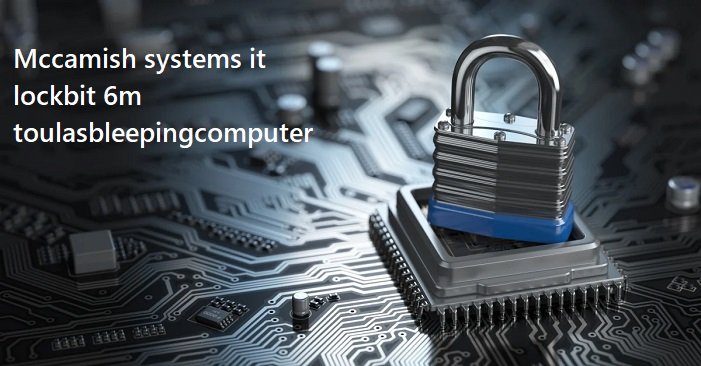McCamish Systems Hit by LockBit Ransomware: $6M Attack Shakes the IT World

As someone who follows cybersecurity developments closely, the recent attack on McCamish Systems by the LockBit ransomware group caught my attention.
McCamish, a well-known IT service provider, became the latest victim of this notorious ransomware group, and the hackers are now demanding a whopping $6 million ransom to avoid leaking sensitive data.
Here’s everything you need to know about the breach, its impact, and what we can learn from this high-profile ransomware incident.
What Happened: LockBit’s $6M Ransom Demands from McCamish Systems
LockBit, a ransomware group with a history of significant cyberattacks, successfully breached McCamish Systems’ IT infrastructure.
They are now holding critical data hostage, threatening to release sensitive information unless their ransom demand of $6 million is paid.
McCamish Systems is a major player in the insurance and IT services space, so the data at risk could be incredibly valuable.
This attack highlights how even established organizations with robust systems are not immune to sophisticated ransomware operations.
How LockBit Infiltrated McCamish Systems
From my understanding and research on similar attacks, LockBit ransomware usually gains access to systems through phishing, exploiting software vulnerabilities, or brute-forcing weak passwords.
While McCamish hasn’t released the full details yet, cybersecurity experts suggest that LockBit may have taken advantage of a vulnerability in one of McCamish’s third-party systems.
This type of breach showcases how important it is to keep all systems patched and up to date, especially third-party applications that may have weaker security controls.
BleepingComputer Reports: What Data Could Be at Risk?
Shortly after the breach, BleepingComputer—a leading cybersecurity news outlet—broke the story that LockBit was involved.
As with other LockBit ransomware attacks, the hackers are likely in possession of sensitive company data, which they threaten to release if their demands aren’t met.
The potential release of McCamish Systems’ data could have serious consequences, especially for its clients in the insurance industry.
If confidential information falls into the wrong hands, this could lead to identity theft, legal repercussions, and loss of trust in McCamish as a service provider.
Why This LockBit Attack Is a Big Deal for IT Companies
As someone who works in the IT field, I know how critical data security is, especially when dealing with customer information.
This attack on McCamish Systems is a wake-up call for IT companies around the world. Even if your systems are secure, attackers are constantly developing new ways to exploit vulnerabilities.
Here are some key lessons we can take away from the McCamish breach:
- Regular Security Audits: No matter how big or secure your company is, it’s important to regularly audit your systems for vulnerabilities and patch any weak points.
- Third-Party Software Vulnerabilities: Even if your internal systems are secure, third-party apps can be the weak link. It’s essential to vet vendors and ensure their software meets high-security standards.
- Preparedness for Ransomware Attacks: Having a solid plan in place to respond to ransomware attacks, including backups and an incident response team, can make all the difference when disaster strikes.
The Growing Threat of LockBit Ransomware
LockBit has become a major player in the ransomware world. With each attack, they seem to improve their tactics, making it harder for companies to defend against them.
Their “Ransomware-as-a-Service” (RaaS) model allows affiliates to carry out attacks in exchange for a portion of the ransom, increasing their reach across industries and regions.
The version of LockBit used in this attack, LockBit 3.0, is even more advanced than its predecessors. It encrypts data more effectively and employs new extortion methods, like threatening to release stolen data on dark web forums.
From what I’ve seen, LockBit’s aggressiveness is only growing. They target companies with sensitive data, knowing they’re more likely to pay to avoid a data leak. McCamish Systems is the latest victim, but it’s unlikely they’ll be the last.
What McCamish Systems Could Do Next
McCamish Systems now faces a critical decision: pay the $6 million ransom or risk their data being leaked. Either way, the damage is already done.
If the ransom is paid, there’s no guarantee the attackers won’t leak the data or come back for more. If they don’t pay, the fallout from a data breach could severely hurt their reputation and business operations.
In the meantime, cybersecurity experts are closely watching the situation. Many companies in the insurance and IT services industry will likely re-evaluate their own security measures in response to this high-profile breach.
Final Thoughts
If there’s one thing the McCamish Systems attack has taught us, it’s that no company is safe from ransomware. LockBit and other groups are becoming increasingly sophisticated, and the price of a breach is only getting higher.
As someone who has seen the evolution of ransomware, I can’t stress enough how important it is to be proactive. Whether it’s regularly updating software, conducting security audits, or training employees to recognize phishing attempts, every layer of security matters.
This attack on McCamish Systems is a reminder to the entire IT industry: stay vigilant, because the threats are constantly evolving.
Do you have any insights or questions about ransomware attacks like this? Feel free to share your thoughts in the comments below—I’d love to discuss this pressing cybersecurity issue with you!





